Table of Contents
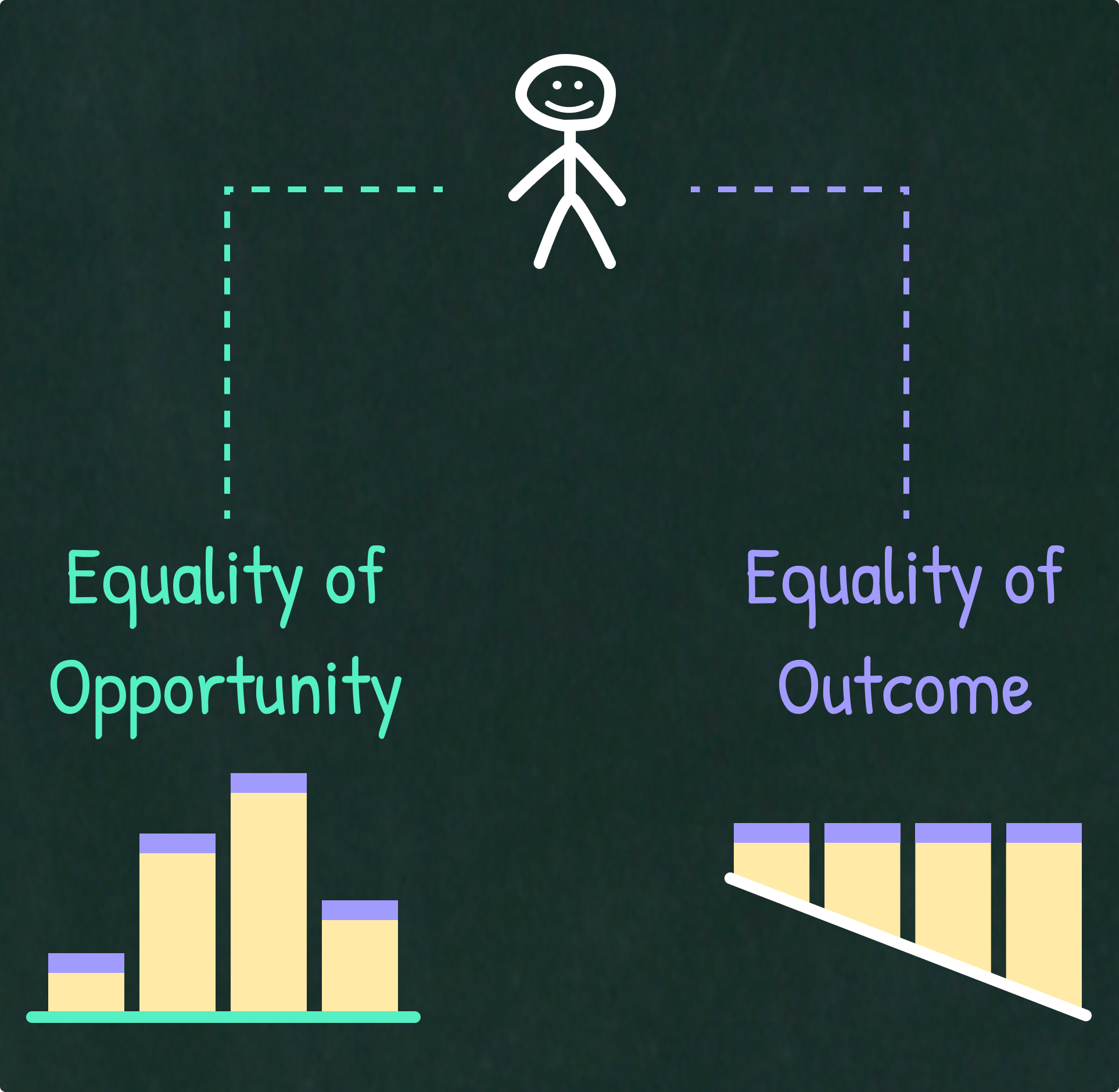 The single best comparison that I’ve ever heard between equality of opportunity vs. equality of outcome comes from Naval Ravikant (founder of AngelList and renowned venture capitalist). It’s not just because the explanation itself is brilliant (which it is), it’s also the fact that he was born in poverty (in Jamaica, Queens) and still built himself into one of the most sought-after VC investors in Silicon Valley. So, he has holistic, personal experience to back up his words on this issue.
The single best comparison that I’ve ever heard between equality of opportunity vs. equality of outcome comes from Naval Ravikant (founder of AngelList and renowned venture capitalist). It’s not just because the explanation itself is brilliant (which it is), it’s also the fact that he was born in poverty (in Jamaica, Queens) and still built himself into one of the most sought-after VC investors in Silicon Valley. So, he has holistic, personal experience to back up his words on this issue.
He delivered this explanation spontaneously on a Periscope livestream:
“Equality of outcome” and “equal opportunity” are two different things (and people confuse them).
Free people — when given equal opportunities — will be free to make different choices. And different choices will map to the real world in different ways and will lead to different outcomes. So, some people will do better, and some won’t. And they will end up with unequal outcomes — because they made unequal choices…
So, you can give people “equal opportunity,” and that’s things like estate taxes, free education…
But “equal outcome” is the exact opposite! “Equal outcome” destroys all motivation and purpose. It destroys markets, destroys signals… That’s the slippery slide to Communism.
So, if you want to have a healthy society, then you give everyone “equal” opportunity. And I say “equal” in quotes because: Life isn’t fair! I mean… You might be born with a crippling disease! That’s not fair. You might be born in the third world! That’s not fair. You might be born to the wrong parents — who just didn’t take care of you the right way. You may have eaten the wrong thing or fallen down the stairs…
There’s no fairness in life! So there’s actually no “equal.” But what you can do is:
– You can try and provide equal resources and equal opportunities.
– Not get too caught up in this idea of “something unfair happened to you” because that will just distract you from doing what you can do, from the things that are under your control.
– And then stay away from “equal outcome.” “Equal outcome” systems are awful.
There is a lot to unpack here and there are many nuances. Thankfully, I learned from Elon Musk the mental model of taking ideas to their extreme — in order to see crystal clear the implications and consequences of a given idea. Therefore, I applied this same mental model to this issue: We will imagine a hypothetical nation that fully adopts equality of opportunity, and another that fully adopts equality of outcome.
How A System With (Extreme) Equality of Opportunity Would Be
First off, the term “equality of opportunity” is a bit misleading — without any additional context, it suggests that people should all have exactly the same opportunities. But that’s not what this is about. It’s not about giving people exactly the same opportunities (that would be a utopia), it’s about ensuring that everyone has an opportunity. An opportunity to develop their potential and get as much ahead as they are willing (and able) to. An opportunity to follow their wildest dreams and pursue their vision of happiness. In essence, an opportunity to build oneself a good life.
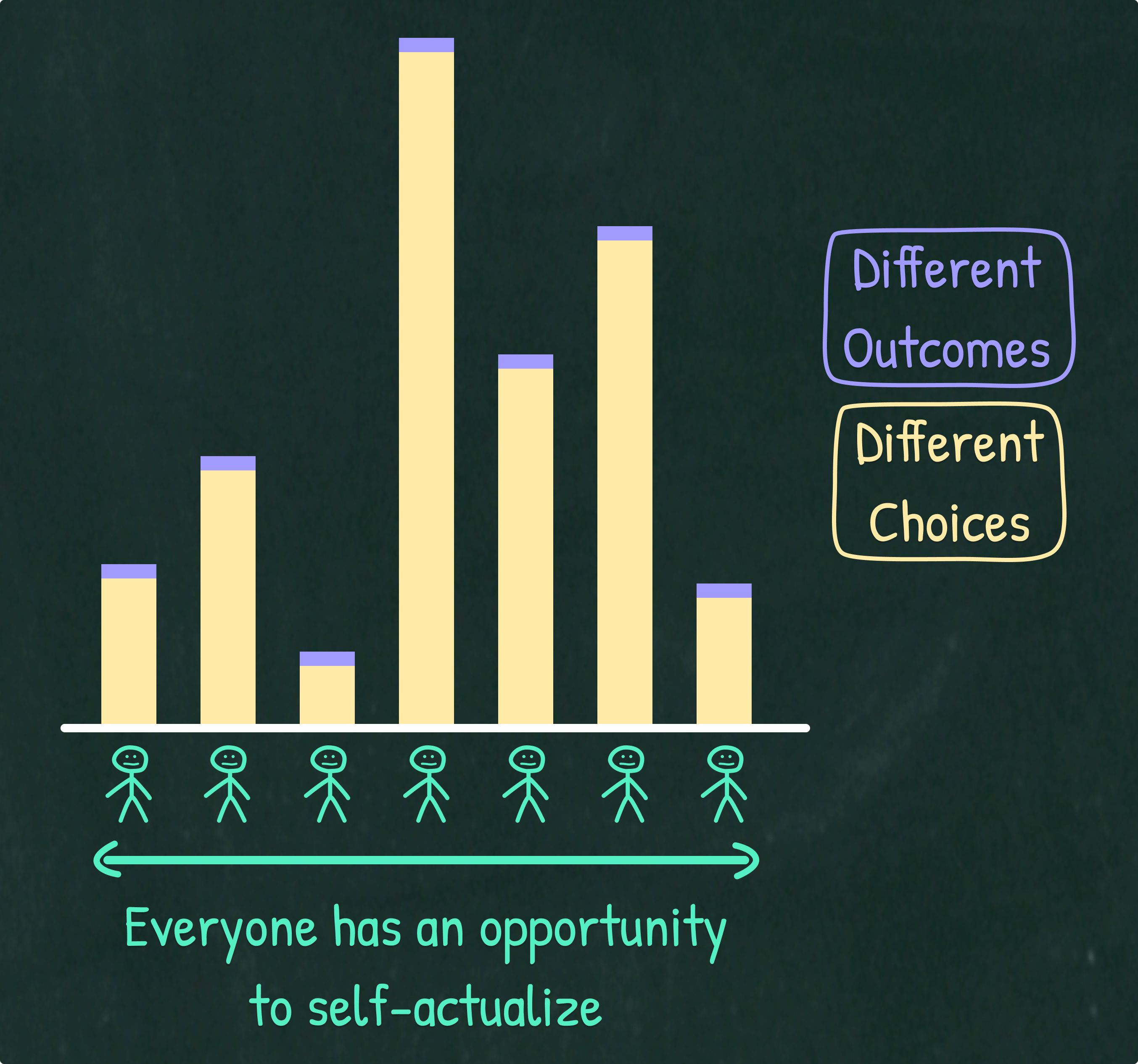
How to Actually Deal With “Unfairness”
If you get too caught up on the idea of ensuring exactly “equal opportunities” you will always feel like a victim. As Naval Ravikant perfectly pointed out, it makes you focus on things that are not under your control. And this is (sadly) very appealing, because focusing on what’s not under your control feels great! You don’t need to do anything, only speak words about what’s wrong and who is to blame. And it can make you feel morally superior: “I’m playing fair, and their not.” But taking on this attitude leaves a hefty bill for the individual to pay in the long term — as it plants the seed for a life of dependency, disempowerment, mediocrity, and misery.
Real victims come from a lack of an opportunity to get ahead, rather than not having exactly the same opportunities as other more fortunate people. Don’t confuse real victimhood with mere envy! And even if you happen to be a real victim, it’s much better for you (as an individual) not to feel like a victim!
Charlie Munger (ex-Vice Chairman of Berkshire Hathaway and ex-Chairman of the Daily Journal Corporation) gave an insightful explanation on this issue at the Daily Journal 2020 Annual Meeting:
[Question from someone in the Audience]:
You’re a testament to the idea of… Not to be a Victim, but to be a Survivor. And it’s an attitude that has helped me in my short life so far. Could you perhaps expand on that idea?
[Charlie Munger]:
Well, it’s really interesting… Some people are victimized by other people. And if it weren’t for the indignation that that causes we wouldn’t have reforms that we need. But that truth is mixed with another… It’s very counterproductive for an individual to feel like a victim — even if he is. Best attitude is just to be cheerful about everything and keep plugging along.
Therefore, I don’t like politicians that get ahead by trying to make everybody else feel like a victim. They make my flesh crawl. And I just don’t believe in it. Of course… Who wants to be a victim instead of a survivor? [Rhetorical question]
You can recognize your position as bad and try to improve it — that’s okay. But to have a deep feeling that it’s all somebody else’s fault is a very counterproductive way to think. People don’t even like being around them. It’s really stupid…
And yet our politicians build on it and try to make their careers work by doing something that’s very bad for all the people they are talking to. And they think they’re doing the world’s work! It’s crazy. It’s absolutely crazy.
There’s also this tweet from Nassim Nicholas Taleb (Author, former Options Trader, and Risk Analyst) which I think is great:
I still don't know what lead to "success". But I know what leads to insuccess: a temperament of complaint, the mentality of permanent victimhood, and the collective and individual propensity for lamentation.
— Nassim Nicholas Taleb (@nntaleb) July 8, 2023
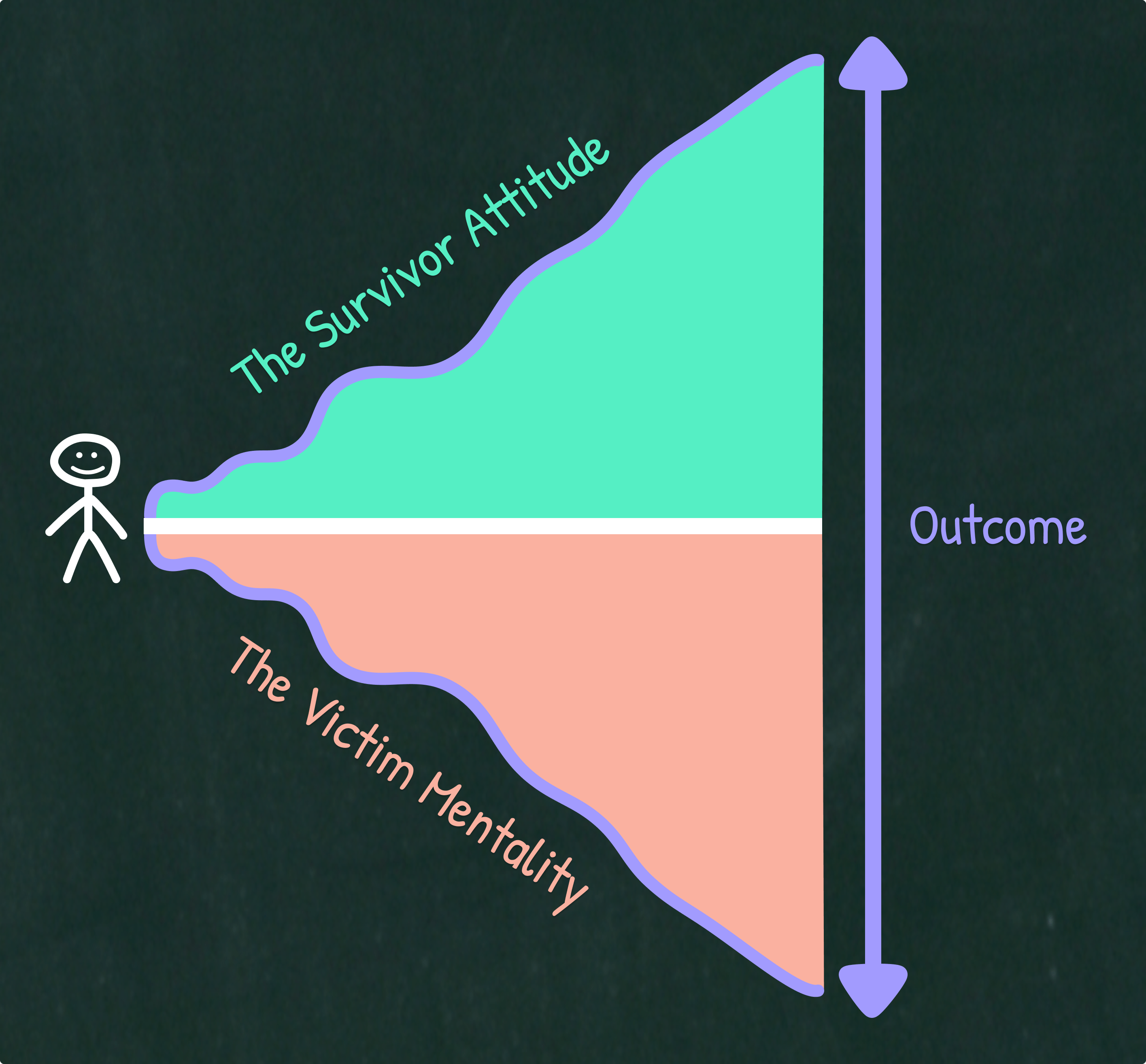
If you happen to be born in the “unlucky group,” but you have the opportunity to get ahead and self-actualize, and you actually leverage that opportunity with your will and effort to build yourself a good life… that’s so much better than having been born in the “lucky group” — because if you already have everything you want (and you don’t have to work for it), it robs your motivation for self-development!
Character is built (and revealed) in hard times, not rosy times. There are no heroes made during the easy times… Adversity is an intrinsic component of the hero’s journey — because it’s by enduring it and prevailing that one becomes a hero.
Fire is the test of gold; adversity, of strong men.
…
Misfortune is virtue’s opportunity.– Seneca (Stoic philosopher of Ancient Rome)
You might wonder: “Well… Why would I want to become a hero?” And the answer is very simple: Your life is your story! As Jeff Bezos said in an interview with Shah Rukh Khan:
You can choose a life of ease and comfort, or you can choose a life of service and adventure… Which one of those, when you’re 90 years old, are you going to be more proud of?
Renowned entrepreneur and investor, Mohnish Pabrai, who was a close friend of Charlie Munger, even said that “large inheritances” do a disservice to your children — because it kills their motivation to become successful in their own right!
In an interview with EquityMaster, Mohnish Pabrai said:
I think the genesis of Dakshana [Mohnish Pabrai’s NGO] came from this notion that I read with [Warren] Buffett — where he was talking about the fact that large inheritances do more harm than good. He was saying: “I want to give my kids enough money for them to do anything they want, but not enough money to do nothing.”
Large inheritances will end up robbing the person of leveraging their capabilities. What we tried to do with my daughters was to give them a sum that would give them a push in life, but it wasn’t like it would be an IV drip for their whole life.
[Warren] Buffett says: “If you are Jesse Owen’s son — the sprinter — you are not going to become the best sprinter if you start a 100-meter dash [race] at the 40-meter line.” He said: “It is okay to put your son at the 10-meter line, but not the 40-meter line.”
So, ironically, having too many opportunities (as a result of being born to a wealthy and well-connected family) can rob you of the most precious opportunity that anyone can have — the opportunity to encounter adversity, endure it, and prevail.
No man is more unhappy than he who never faces adversity. For he is not permitted to prove himself.
– Seneca
Do not pray for an easy life, pray for the strength to endure a difficult one.
– Bruce Lee
In a recent address at Stanford University, co-founder and CEO of Nvidia, Jensen Huang (currently the 17th richest man in the world) put it beautifully in response to a question:
[Interviewer]:
Stanford has a lot of aspiring entrepreneurs. Students that are entrepreneurs. And maybe they’re Computer Science majors, or Engineering majors of some sort. What advice would you give them to improve their chances of success?
[Jensen Huang]:
I think one of my great advantages is that I have very low expectations. And I mean that.
Most of the Stanford graduates have very high expectations. And you deserve to have high expectations because you came from a great school. You were very successful, you’re top of your class, obviously you were able to pay for tuition, and then you’re graduating from one of the finest institutions on the planet. You’re surrounded by other kids that are just incredible. You naturally have very high expectations…
[But] People with very high expectations have very low resilience. And unfortunately, resilience matters in success. I don’t know how to teach it to you except for… “I hope suffering happens to you.”
And I was fortunate that I grew up with my parents providing a condition for us to be successful (on the one hand); but there were plenty of opportunities for setbacks and suffering… And to this day, I use the phrase “pain and suffering” inside our company with great glee. And I mean that… You know “Boy, this is going to cause a lot of pain and suffering.” And I mean that in a happy way! Because you want to refine the character of your company. You want greatness out of them. And greatness is not intelligence (as you know). Greatness comes from character. And character isn’t formed out of smart people, it’s formed out of people who suffered.
And so if I could wish upon you — I don’t know how to do it, but — for all of you Stanford students, I wish upon you ample doses of pain and suffering.
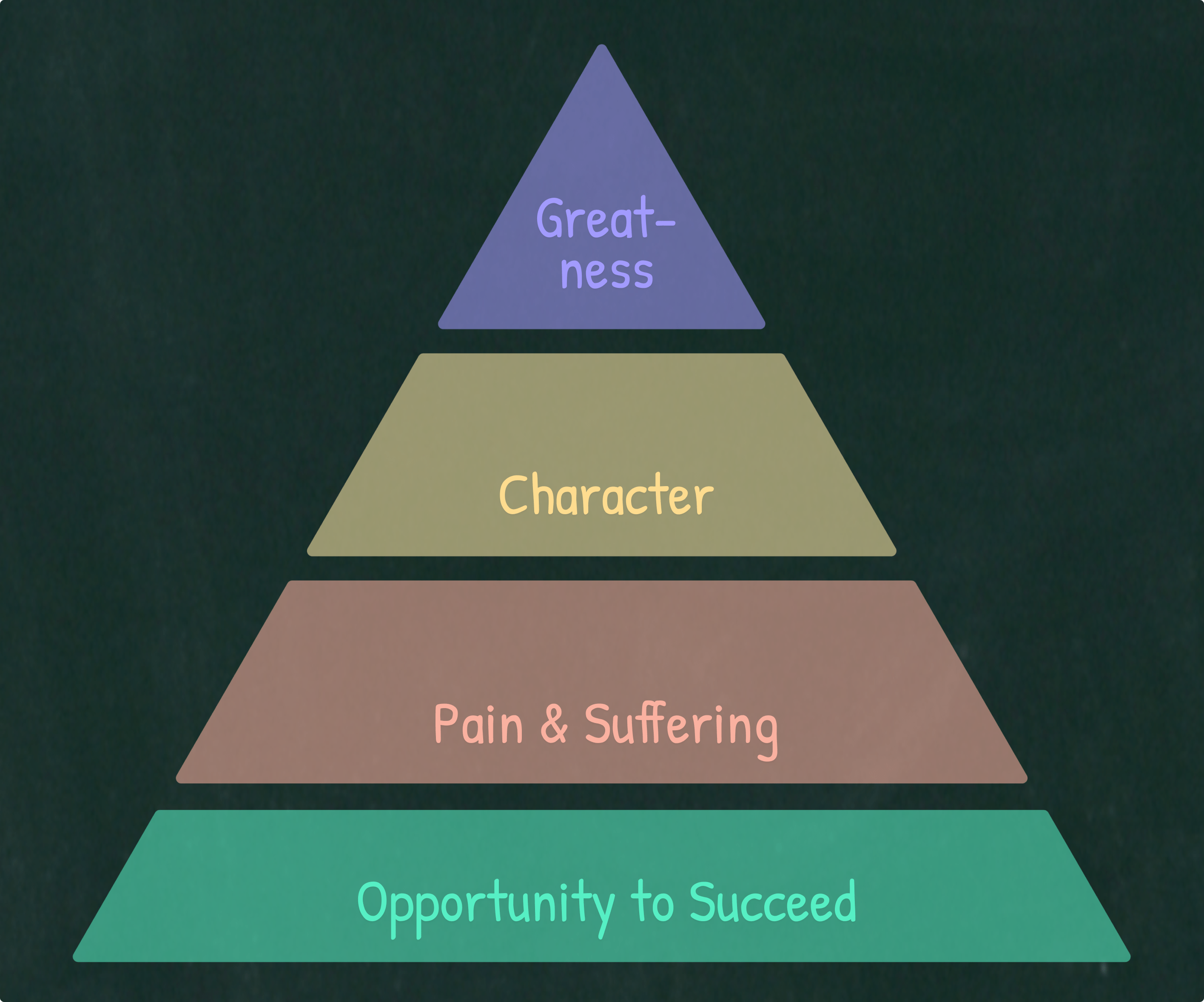
How a System With (Extreme) Equality of Outcome Would Be
A system with perfect equality of results (or outcomes) would inevitably lead to a tyrannical government and a financially poor society for three reasons:
1. To fully impose it, violence is required. Because you need to forcefully take from someone in order to “redistribute” — why do I put this word in quotation marks? Find out in the next reason below…
2. It kills people’s right (and motivation) to self-actualize and prosper. And ironically, when that right is removed, eventually there will be nothing to redistribute! Because no one will be incentivized to serve society if they can’t capture an economic value from their service.
3. Lastly, a system with perfect equality of outcomes would make the state so powerful that corruption and tyranny are guaranteed.
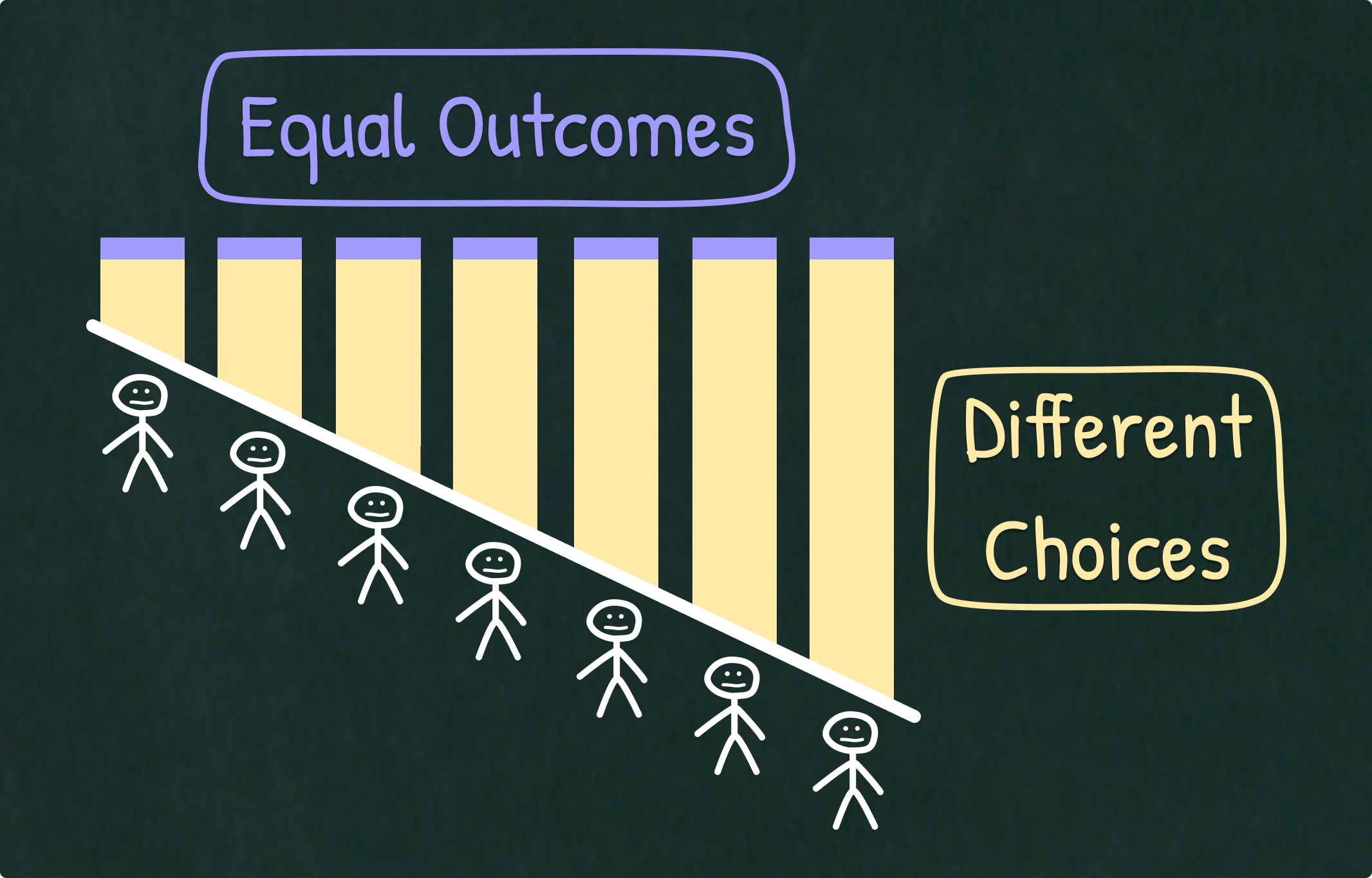
Renowned psychologist and author, Jordan Peterson, explained this idea perfectly (with a historical event) on The Joe Rogan Experience Podcast:
There’s a set of books that laid this out perfectly:
[#1] Dostoyevsky wrote a book called Devils and it’s a description of the initial breakdown of the Orthodox Christian society in Russia in the late 1800s and the rise of radical socialist ideas. So it’s sort of like the prodrome [early symptom] to the Russian Revolution. It’s a brilliant book.
[#2] Then, if you read after that, Solzhenitsyn’s Gulag Archipelago — what he does in that book is quite remarkable. He says: “Look, there were tens of millions of people killed from 1919 to 1959 in the Soviet Union — as a consequence of internal repression.” And it’s so dreadful that words can’t do it justice. I mean… It’s absolutely dreadful what happened in the Soviet Union, just for starters 6 million Ukrainians died in the 1930s because of enforced starvation.
In fact, in the 1930s, here’s how terrible it was: All the food that the (newly) collectivized farmers had produced — which wasn’t very much by the way — was taken from them and brought to the cities. So, all the farmers starved to death. Now, here’s how draconian it got: So let’s say you were the mother of some children, and all your grain had been shipped off to the cities, and you thought, “Well, I’m not gonna have my children starve to death. I’m gonna go out in the field and (on my hands and knees) I’m gonna pick up the grains that are left over — that the harvesters didn’t get — and I’m going to feed those to my kids.” That was punishable by death! You were supposed to hand in those extra bits of grain so that they could be shipped to the city as well.
So, that was just the beginning of the fun in the Soviet Union. And what Solzhenitsyn did was say: “Look, this wasn’t a consequence of the Marxist System gone wrong. This was a consequence of the Marxist System — it was an inevitable consequence of the axioms of the Marxist System.” And I think he got it right… that’s why he won the Nobel Prize.
How much tyranny [do] you have to impose in order to produce something like equality of outcome? And Thomas Sowell has talked about this a little bit too… He said: “What the people who are agitating for equality of outcome don’t understand is that you have to cede so much power to the authorities (the government) in order to ensure equality of outcome that a tyranny is inevitable…”
As award-winning novelist, Andrew Klavan, put it:
Free people can treat each other justly, but they can’t make life fair. To get rid of the unfairness among individuals, you have to exercise power over them. The more fairness you want, the more power you need. Thus, all dreams of fairness become dreams of tyranny in the end.
Protecting just hierarchies of competence should be the political aim of the state — not egalitarianism. As a society you accept a certain level of inequality in order to fuel innovation — nobody begrudges those who rise to the top in the military’s special forces or in sports because their accomplishments were just, i.e. free of favoritism, corruption, or other forms of cheating. You want the best in each field to be able to rise to the top. And you want individuals to figure out where they can become the best and then apply themselves to doing so because it benefits them individually, and society as a whole.
Conclusion
After seeing how a nation-state would look like with each system, there’s no doubt that the best that we can get as a society is one where everyone has an opportunity to advance in life and develop their potential insofar as they are willing (and able) to.
And in this kind of system you always have the choice (but not the obligation) to give back to charitable causes that you care about. That’s true virtue — when you choose to be benevolent and do good deeds.
Renowned historian Victor Davis Hanson made this point during a donor speech at Hillsdale College:
I think the greatest treatise that’s ever been written on politics is Aristotle’s “Politics” because he transcends the particular case studies that he educes. What he just assumes is there’s always going to be a class struggle or political struggle between different groups. And if I could reduce that to a banality, there’s some people who believe in equality of opportunity and some believe in a state-mandated equality of result. The people who believe in the equality of opportunity say this: “Unfortunately, we weren’t all born equally. Some of us have more talent. Some of us have better health. Some of us have better luck. Some of us had a rich grandfather. Life is unfair. But let us go and do our thing. And then we will have social pressures, like you people, here, to give back. Let me go make a lot of money. And then let me choose to help support Hillsdale. I will do that. I’m not a greedy person. There’s only so hot that my shower can get. And my BMW only goes so fast. I can’t spend all that I’m going to make. But I want to do it for a variety of reasons.”
That group is usually attacked by people for various reasons. Plato and Aristotle were no dummies. They talk about psychological reasons — that people get envious. “Envy and jealousy”, Hesiod said, “are the two most powerful emotions we have.” The other people (Progressives) say: “We can’t trust those people. They don’t give in a way that’s rational or moral.” So we want to take what they have and distribute it to the more noble people. And that dichotomy is the story of Western civilization.
And when it works, we keep it within the boundaries. We have certain ground rules: You shall not resort to violence. You shall relegate politics to a secondary level. And you will absorb it with nationalist pride and collective patriotism.
I also think it is helpful to think about these concepts as a function of the scale. We have only talked about the effects at a nation-state (large scale) level, but what about its implementation in one’s own personal relationships, i.e. with friends and family? Naval Ravikant talked about this too on The Joe Rogan Experience Podcast:
I always liked Nassim Taleb’s framing on this… Where he said:
“With my family, I’m a Communist.”
“With my close friends, I’m a Socialist.”
“At my state level politics, I’m a Democrat.”
“At higher levels, I’m a Republican.”
“And at the federal level, I’m a Libertarian.”
The larger the group of people you have massed together — who have different interests — the less trust there is, the more cheating there is… The better the incentives have to be aligned, the better the system has to work, the more you go towards capitalism.
The smaller the group (you’re in your kibbutz, you’re in your commune, you’re in your house, or you’re in your tribe) by all means be a socialist. With my aunts, with my brother, with my cousins, with my uncles, with my mom… I’m a socialist! That’s the right way to live a loving [and] happy integrated life.

Key Takeaways – Equality of Opportunity vs. Equality of Outcome
- Equality of Opportunity means that everyone gets an opportunity to pursue for themselves a good life. It does not concern social justice or fairness, but rather that everyone has the possibility to flourish and develop their potential.
- Equality of Outcome is about redressing inequalities so that everyone gets the same result. Instead of setting up the conditions for human flourishing, it sets the conditions for human detriment—as it destroys people’s motivation and limits their potential. Also, the state must resort to violence (to make the system work) and it’s inevitable (given the power imbalance) that it would become corrupted.
If You Liked This Essay, Check Out These Sources
- Video — Naval Ravikant’s Periscope Livestream
- Video — Charlie Munger at the Daily Journal Annual Meeting (2020)
- Video — Jeff Bezos’s interview with Shah Rukh Khan
- Video — Mohnish Pabrai’s interview with EquityMaster
- Video — Jensen Huang’s Keynote at Stanford (2024)
- Video — Jordan Peterson on The Joe Rogan Experience Podcast
- Devils, by Fyodor Dostoevsky.
- Gulag Archipelago, by Aleksandr Solzhenitsyn.
- Website — Andrew Klavan
- Essay — “Victor Davis Hanson: Nationalism, Good and Bad”
- Video — Naval Ravikant on The Joe Rogan Experience Podcast